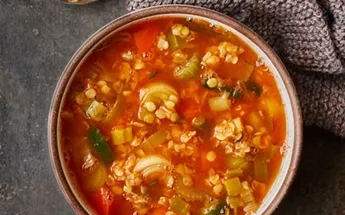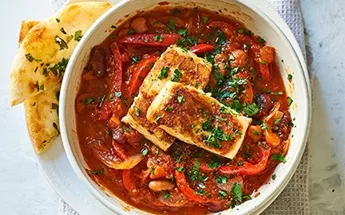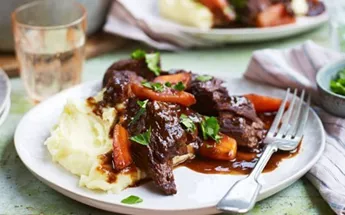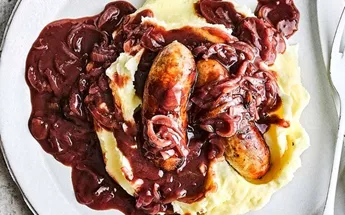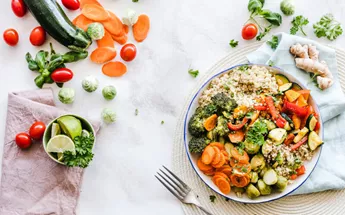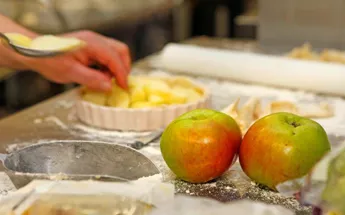What foods will keep me warm this winter?
It is that time of year again where the nights start drawing in, the leaves are falling and it's time to snuggle up on the sofa with a thick blanket to keep warm. A great way to keep warm is to eat hot food and drink hot drinks.
The most important meal of the day
Breakfast has long been known as the most important meal of the day. Having breakfast sets you up for the day improving your health, memory and concentration. A bowl of porridge is a perfect breakfast for the colder days ahead, you can have plain porridge or add some fruit for a boost of vitamin C such as strawberries and blueberries.
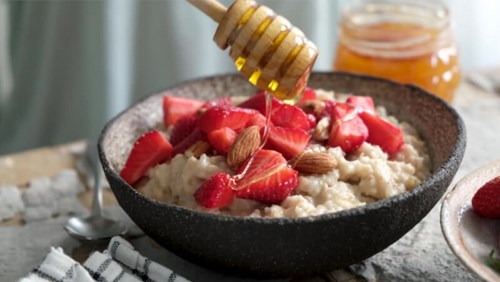
What else could I add to my porridge?
There are many things you can add to make it different each day, some of the following things can really bulk up your porridge and not only do they add flavour, they also keep you fuller for longer.
- Honey
- Jam
- Blackberries
- Raspberries
- Banana
- Raisins
- Walnuts
- Peaches
- Chia seeds
- Nutmeg
- Cinnamon
What should I include in my meals?
You are more likely to get a cold in winter therefore it is important to ensure your immune system is in good shape. Winter vegetables are ideal for a comforting meal.
Cupboard staples for making winter meals:
- Cereals
- Pasta and rice
- Canned vegetables
- Stock
- Tinned tomatoes
- Tinned tuna in water
- Oil
- Herbs and spices
- Potatoes
The ideal winter meals to keep you warm and feeling full are casseroles/stews and soups.
The benefits of casseroles and soups
- You can easily get in your five-a-day by adding multiple vegetables, including beans and pulses.
- Casseroles and soups can be put in the slowcooker in a morning and cook steadily through the day so you have a hot meal ready to come home to after a long day.
- Making a large batch can make multiple meals which you can also freeze for another day - BBC Good Food has many freezable recipes you could try.
- Meals such as these are ideal to make if you are on a budget.
We have put together some winter warmers from BBC Good Food to get you started:
Winter vegetable & lentil soup
Ingredients
- 85g dried red lentils
- 2 carrots, quartered lengthways then diced
- 3 sticks celery, sliced
- 2 small leeks, sliced
- 2 tbsp tomato purée
- 1 tbsp fresh thyme leaves
- 3 large garlic cloves, chopped
- 1 tbsp vegetable bouillon powder
- 1 heaped tsp ground coriander
Method
- STEP 1
Tip all the ingredients into a large pan. Pour over 1½ litres boiling water, then stir well.
- STEP 2
Cover and leave to simmer for 30 mins until the vegetables and lentils are tender.
- STEP 3
Ladle into bowls and eat straightaway, or if you like a really thick texture, blitz a third of the soup with a hand blender or in a food processor.
Bean and halloumi stew
Ingredients
- 3 tbsp olive oil
- 1 onion , thinly sliced
- 1 red pepper , thinly sliced
- 2 garlic cloves , crushed
- 3 tbsp red chilli pesto , sundried tomato pesto or vegan alternative
- 1 heaped tsp ground coriander
- 400g can mixed beans , drained and rinsed
- 400g can chopped tomatoes
- ½ x 250g block halloumi , sliced
- ½ small bunch of coriander , finely chopped
- garlic bread , to serve (optional)
Method
- STEP 1
Heat 2 tbsp of oil in a frying pan over a medium heat. Add the onion and pepper, along with a pinch of salt and fry for 10 mins or until softened. Add the garlic, pesto and ground coriander, and cook for 1 min. Tip in the beans and tomatoes along with ½ can of water, then bring to a simmer and cook uncovered for 10 mins.
- STEP 2
Add the remaining oil to a separate frying pan over a medium heat. Fry the halloumi for 2 mins on each side or until golden brown.
- STEP 3
Taste the beans for seasoning, then spoon into deep bowls. Top with the halloumi and scatter over the chopped coriander. Serve with garlic bread, if you like.
Slow cooker beef stew
Ingredients
- 1 onion, chopped
- 2 celery sticks, finely chopped
- 2 tbsp rapeseed oil
- 3 carrots, halved and cut into chunks
- 2 bay leaves
- ½ pack thyme
- 2 tbsp tomato purée
- 2 tbsp Worcestershire sauce
- 2 beef stock cubes or stock pots
- 900g beef for braising such as skirt, buy a whole piece and cut it yourself for bigger chunks or buy ready-diced
- 2 tsp cornflour (optional)
- ½ small bunch parsley, chopped
- buttery mash, to serve (optional)
Method
- STEP 1
Fry the onion and celery in 1 tbsp oil over a low heat until they start to soften – about 5 mins. Add the carrots, bay and thyme, fry for 2 mins, stir in the purée and Worcestershire sauce, add 600ml boiling water, stir and tip everything into a slow cooker. Crumble over the stock cubes or add the stock pots and stir, then season with pepper (don’t add salt as the stock may be salty).
- STEP 2
Clean out the frying pan and fry the beef in the remaining oil in batches until it is well browned, then tip each batch into the slow cooker. Cook on low for 8-10 hrs, or on high for 4 hrs.
- STEP 3
If you want to thicken the gravy, mix the cornflour with a splash of cold water to make a paste, then stir in 2 tbsp of the liquid from the slow cooker. Tip back into the slow cooker, stir and cook for a further 30 mins on high. Stir in the parsley and season again to taste. Serve with mash, if you like. Leave to cool before freezing.
Bangers and mash with onion gravy
Ingredients
- 1 tbsp sunflower oil
- 8 pork sausages (the best quality you can find)
- small knob of butter
- 3 small onions, finely sliced
- 1 thyme sprig
- 1 bay leaf
- pinch of sugar
- 1 heaped tsp plain flour
- 1 tbsp red wine vinegar
- 1 glass red wine
- 1 tsp soy sauce
- 400ml beef stock made with 1 stock shot or cube
For the mash
- 1 kg King Edward potatoes, peeled and cut into large chunks
- 100ml whole milk or 50ml milk and 50ml cream
- 50g cold butter, diced
- grating of nutmeg
Method
- STEP 1
Heat the oven to 200C/180C fan/gas 6. Heat the oil in an ovenproof frying pan and gently sizzle the sausages over a medium-high heat for 8-10 mins, turning them, until browned on all sides. Transfer to a plate, then put the butter in the pan and heat until sizzling. Scatter in the onions, stirring them into the butter, then add the thyme sprig, bay and sugar. Give everything a final stir, then put the sausages on top and drizzle over any juices from the plate. Roast everything for 20 mins, turning the sausages halfway through.
- STEP 2
Meanwhile, make the mash. Tip the potatoes into a pan of cold salted water and bring to the boil, then turn down and simmer for 10-12 mins or until just cooked all the way through (the tip of a knife should slide in easily). Drain in a colander and leave for a minute. Tip the milk into the pan and bring to a simmer, then pass the potatoes through a ricer into the hot milk and mash thoroughly. Once mashed, beat with a wooden spoon or spatula over very low heat, then beat in the butter a few bits at a time. You should have extra-fluffy, smooth mash. Keep it warm.
- STEP 3
When the sausages are cooked, remove from the oven, turn the oven off and lift the sausages onto a tray. Return them to the oven to keep warm. Put the pan back on the heat and give the roasted onions a stir, they should be sticky and slightly burnt around the edges. Sizzle for a minute or two more to caramelise, then stir in the flour and cook for another minute. Splash in the vinegar, simmer for a minute, then pour over the red wine and soy, and bubble down to a gloopy paste. Pour over the stock and boil for 3-4 mins, or until you have a rich gravy. If you prefer, scoop out the thyme and bay, or just leave it in. Tip into a bowl or gravy jug with a serving spoon for the onions. Bring everything to the table and scoop a big mound of mash onto the middle of each plate, then top with the sausages and gravy.
All recipes were taken from BBC Good Food.
Next Steps
Healthy eating
Learn more about the ways you can overhaul your diet and eat healthier meals.
Autumnal recipes
Further inspiration for tasty meals with some autumnal recipes.
The benefits of eating together
Learn more about the benefits of eating together later in life.
